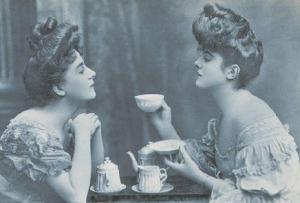This is a guest post by Bianca Harrisskitt, one of IHR Digital’s interns from the University of Leicester.
 The growth of consumerism is a topic that seems to be receiving ever increasing academic attention, as historians, sociologists, economists and many others seek to study and explain the rise of the consumer culture. Professor Frank Trentmann of Birkbeck College delivered a lecture in March 2010 called ‘The Consumption of Culture’, as part of a larger project entitled ‘the Consuming Passion’, which sought to chart the history of consumption from 1600 to the present day.
The growth of consumerism is a topic that seems to be receiving ever increasing academic attention, as historians, sociologists, economists and many others seek to study and explain the rise of the consumer culture. Professor Frank Trentmann of Birkbeck College delivered a lecture in March 2010 called ‘The Consumption of Culture’, as part of a larger project entitled ‘the Consuming Passion’, which sought to chart the history of consumption from 1600 to the present day.
The speaker identifies the two main problems which plague the historical understanding of the place of global developments and empire within the history of consumption. These include, firstly, the lack of research by historians on the period 1700 to 1900 and secondly, the ‘power vacuum’ in most consumer theories. Thus, in this lecture, the speaker strives to cover the 1700 to 1900 period, whilst paying attention to the role that power plays in the pattern of consumption.
In order to do this, Professor Trentmann aims to address four thematic areas of the history of consumption: the expansion of ‘drug foods’ (including chocolate, tea, coffee and sugar), slavery, the role of the consumer within imperial relations and the value of objects in relation to place. Through exploring these tropes Professor Trentmann aims to pinpoint how ‘empire’ impacted on consumers, and furthermore if and how consumers impacted on ‘empire’.
Additionally, the importance of time and the differences that occur over different time periods are considered throughout the speech. For example, Trentmann points out that tea is a typical example of the way in which exotic products embedded colonial meanings as well as colonial trade in ordinary lives in the eighteenth century, highlighting the impact of empire on consumers. However, the speaker states that whilst this is right for the eighteenth century, it does not necessarily apply to subsequent centuries. Patterns change over time, and Professor Trentmann goes to great lengths to demonstrate this.
On a concluding note, although the podcast is incomplete and we therefore do not get to hear Professor Trentmann elaborate on his final two thematic areas, his main argument is clear; it is absolutely crucial to engage with the entire time period, from 1600 up until the present day in addition to paying close attention to the role of power in order to understand the topic as a whole. Professor Trentmann therefore provides an informative and stimulating overview of the historical development of consumption and the approach needed in order to study.
